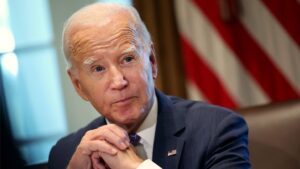President Joe Biden
President Joe Biden’s decision to end his reelection campaign on Sunday followed strategic missteps. His campaign team and White House aides made errors that raised concerns. People doubted the 81-year-old president’s ability to win in November or run the country for another four years.
The Debate Coup: April to June
Biden himself set the debate in motion. He told radio show host Howard Stern in April that he’d debate Trump. Some Democratic allies worried a debate might harm his chances. Despite this, Biden’s aides thought they scored a coup. They agreed to a June debate, working with CNN to shape favorable rules. The format seemed to favor Biden’s style. No audience, trusted moderators, and a mute button were included.
Jet Lag: June 4 to 27
Biden flew to Europe twice and to the West Coast over 14 days. He took only a few days to rest at his vacation home in Delaware. Observers noticed he was tired and dragging. On June 21, Biden and his aides headed to Camp David for focused prep sessions. They peppered him with details and followed up with mock debates for seven days.
A Bad Night: June 27
In CNN’s Atlanta studios, Biden stumbled over his words and lost his train of thought. Reporters noticed his delivery, appearance, and voice. Officials told reporters that Biden was sick with a cold. His hoarseness improved, but his disjointed answers surprised voters, donors, and Democratic officials. One strategist called it “a disaster.” Trump, 78, repeated glaring falsehoods, claiming he won the 2020 election. Biden failed to refute them, leaving sentences and thoughts unfinished. Trump jabbed, “I really don’t know what he said at the end of that sentence. I don’t think he knows what he said.”
Fallout: June 27 to July 2
“I know I’m not a young man, to state the obvious,” Biden admitted the day after the debate. “Nearly fell asleep on stage,” he said on July 2. Calls for Biden to step down started hours after the debate. Biden aides didn’t reach out to worried Democrats until days later. Some lawmakers broke ranks, starting with U.S. Representative Lloyd Doggett on July 2. Angry donors demanded a turnaround in Biden’s performance. Senior Democrats and Biden allies hinted at changes to the ticket. House Democrat Jim Clyburn, instrumental in Biden’s 2020 win, suggested backing Vice President Kamala Harris if Biden departed. Former House Speaker Nancy Pelosi hinted Biden should examine his choice to stay in the race.
The Dam Breaks: July 5 to 8
Biden failed to quiet the dissent chorus. In a major interview on July 5, Biden told ABC News anchor George Stephanopoulos that only the “Lord Almighty” could cast him from the race. He said he could accept losing to Trump if he gave it his all. Thirty-six Democratic lawmakers and one independent called for Biden to step off the ticket over 24 days after the debate.
NATO and Polls: July 9 to 12
Biden tried to move on. He gave interviews, held press conferences, and delivered speeches on the campaign trail and at the NATO summit. But concerns persisted. At the NATO summit in July, Biden mixed up names, raising more doubts. Polls showed Biden trailing other Democrats in key states and districts. Nationwide polls pointed to a close race. Biden remained convinced he was the best candidate to face Trump, reinforced by close aides.
Trump Rally Shooting: July 13
Trump was shot while giving a speech in Pennsylvania. The bullet grazed his ear, bloodied his face, and photos of Trump holding up his fist in defiance spread widely. Republicans unified around their candidate. Democrats saw a narrower path to victory. Days later, Biden contracted COVID while campaigning in Nevada. Recuperating at his Rehoboth Beach home, he had time to decide whether and how to end his campaign.
President Biden’s campaign was marked by strategic errors and unforeseen challenges. Despite efforts to regain momentum, the combination of missteps and external events led to his decision to step down. His departure marks a significant moment in American political history.






